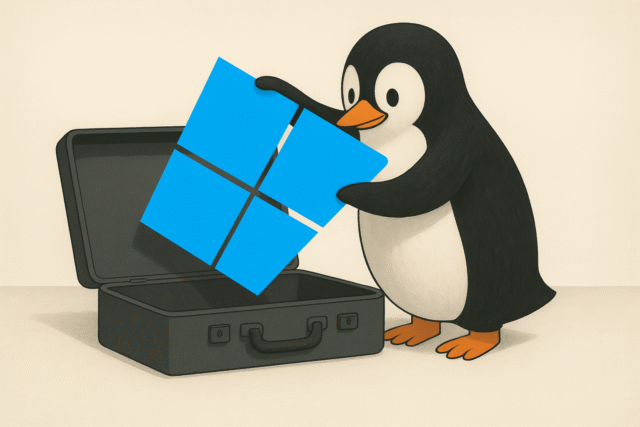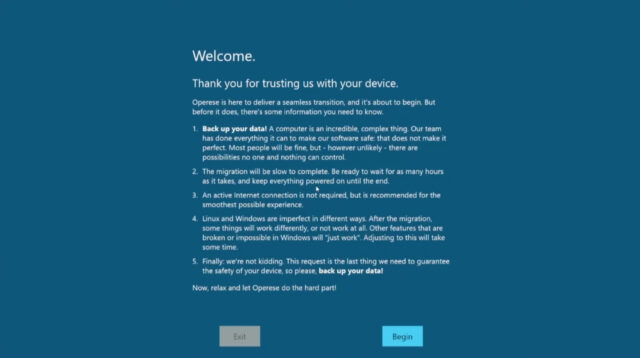Saying no to Windows 11 just got easier -- Operese automatically transfers your Windows 10 files and settings to Linux

Microsoft is ending support for Windows 10 on October 14, 2025, leaving over 200 million devices unable to upgrade to Windows 11.
While some users may be considering buying a new computer or paying for extended support, one student developer is offering another path: switching to Linux with the help of a free migration tool called Operese.
SEE ALSO:
- CrapFixer update fixes Windows 11 and turns it into the operating system you deserve -- download it now!
- This new Windows 11 clone is actually Linux and runs faster on your old PC -- get it now
- Ditch Windows 11: SparkyLinux 7.8 is the lightweight alternative to Microsoft's OS you've been looking for
Windows 10 has been a mainstay of the PC world for nearly a decade, but its end-of-life date is now firmly in sight, meaning security updates and new features will stop coming unless users either pay for extended updates or upgrade to a supported system.
The catch of course is that not all Windows 10 PCs meet the system requirements for Windows 11, which include things like a TPM 2.0 chip and newer CPUs. For older hardware, those updates are simply not available.
The solution pushed by Microsoft is either to upgrade your hardware or stay behind and take the security risk.
For many users, especially those with laptops and desktops that are working perfectly fine, replacing usable machines isn’t appealing. This is where Linux comes in, and where Operese can help.
Windows-to-Linux migration tool
Operese is a tool created by TechnoPorg, a Canadian-German engineering student at the University of Waterloo.
His idea is simple: take your existing Windows 10 installation and "translate" it into a Linux setup, keeping as much of your original data, settings, and apps as possible.
The tool installs a customized version of Kubuntu, a Linux distribution that offers a familiar desktop experience for former Windows users.
Operese is still early in development, and the creator is frank about its current limitations. It doesn’t yet move every application over, and some installs may need to be done manually after the fact.
The core promise is already working though. Operese takes a Windows computer and gives it a fresh start on Linux, with minimal friction for the user.
Linux has long had a reputation for being tricky, niche, or only for tech enthusiasts, but that’s starting to change. Linux operating systems power everything from game consoles to government computers and it offers better performance on older hardware, plus stronger privacy, and a smoother update experience.
Distributions like Kubuntu offer a clean and customizable desktop environment that’s visually close enough to Windows.
One of the biggest strengths of Linux, especially in the context of aging Windows 10 machines, is its support for older hardware. Where Windows 11 refuses to install on certain CPUs, many Linux distributions continue to support them for years to come. If your system still works well under Windows 10, there's a good chance it will run faster and better under Linux.

Security concerns
After October 2025, Windows 10 will stop getting official patches. While it won’t suddenly become unsafe overnight, unpatched systems will be a tempting target for hackers and malware. No system is immune to threats, obviously, but Linux tends to offer a safer experience out of the box with a stronger permission model and smaller attack surface.
As TechnoPorg says, "Linux and Windows are imperfect in different ways". Some programs you use on Windows may not be natively available on Linux, although tools Like Wine can help here.
For general browsing, media playback, productivity, and even gaming, Linux has come a long way. Platforms like Steam support thousands of titles, and web-based apps cover many of the gaps.
Operese doesn’t claim to solve every problem, but it does aim to make the migration process simpler. Rather than wiping your drive and hoping for the best, it offers a guided migration that transfers the essentials and helps users land on their feet in a Linux environment.
The creator says he plans to open-source the code in the future, once it's more stable and documented. For now, he’s still developing it solo, with updates expected as he balances work and school.
He has no plans to switch the base distribution away from Kubuntu, but future updates will aim to make Operese more flexible for users who prefer different flavors of Linux.
It’s clear from his presentation, which you can watch below, that this is a project built with passion and a deep respect for both platforms. He acknowledges where Linux is lacking and where Windows does things well, but his main argument is that users should have a choice, especially when Microsoft’s two solutions involve either spending money or taking security risks.
What do you think about switching to Linux now that Windows 10 is ending? Let us know in the comments.
